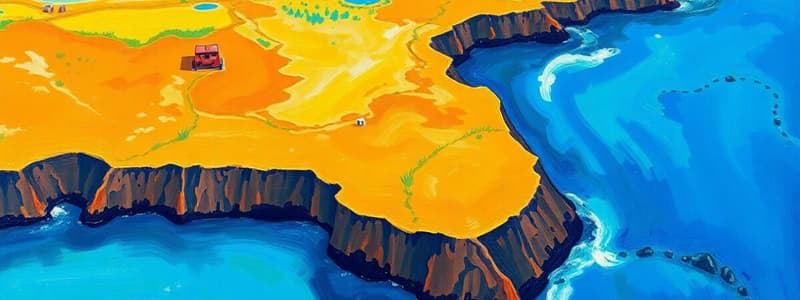Podcast
Questions and Answers
What is the localized drop in the water table around a water well called?
What is the localized drop in the water table around a water well called?
- Subsidence
- Saltwater intrusion
- Cone of depression (correct)
- Water stress
What is the term for the gradual sinking of land surface over a large area due to a drop in the water table?
What is the term for the gradual sinking of land surface over a large area due to a drop in the water table?
- Subsidence (correct)
- Aqueduct
- Water stress
- Cone of depression
What is the process of removing salt from seawater to make it usable for drinking water called?
What is the process of removing salt from seawater to make it usable for drinking water called?
- Desalination (correct)
- Aqueduct
- Conservation
- Reservoir
What does the term 'water stress' refer to?
What does the term 'water stress' refer to?
What is one way future global warming could worsen the water crisis?
What is one way future global warming could worsen the water crisis?
What can overpumping of freshwater aquifers near ocean coastlines cause?
What can overpumping of freshwater aquifers near ocean coastlines cause?
What is a method of water conservation that involves catching and storing rainwater?
What is a method of water conservation that involves catching and storing rainwater?
What is it called when the regional water table drops significantly due to a large number of wells pumping water for a long time?
What is it called when the regional water table drops significantly due to a large number of wells pumping water for a long time?
What is a structure built to store water for later use?
What is a structure built to store water for later use?
What is a structure used to move water from one location to another?
What is a structure used to move water from one location to another?
Which factor can impact the ecosystem when constructing dams and reservoirs?
Which factor can impact the ecosystem when constructing dams and reservoirs?
Which of these actions is an example of water conservation?
Which of these actions is an example of water conservation?
What is the purpose of efficient irrigation systems like drip systems?
What is the purpose of efficient irrigation systems like drip systems?
What is a drawback of water diversion through aqueducts?
What is a drawback of water diversion through aqueducts?
In what type of area is desalination most commonly used?
In what type of area is desalination most commonly used?
Flashcards
Cone of Depression
Cone of Depression
A localized drop in the water table around a well due to pumping.
Groundwater Mining
Groundwater Mining
Significant depletion of groundwater due to sustained pumping.
Saltwater Intrusion
Saltwater Intrusion
The intrusion of saltwater into freshwater aquifers due to overpumping near coastlines.
Subsidence
Subsidence
Signup and view all the flashcards
Sinkholes
Sinkholes
Signup and view all the flashcards
Water Crisis (Water Stress)
Water Crisis (Water Stress)
Signup and view all the flashcards
Reservoirs
Reservoirs
Signup and view all the flashcards
Aqueducts
Aqueducts
Signup and view all the flashcards
Desalination
Desalination
Signup and view all the flashcards
Water Conservation
Water Conservation
Signup and view all the flashcards
Rainwater Harvesting
Rainwater Harvesting
Signup and view all the flashcards
Efficient Irrigation
Efficient Irrigation
Signup and view all the flashcards
Study Notes
Water Supply Problems: Resource Depletion
- Groundwater pumping from wells leads to a localized drop in the water table, forming a cone of depression.
- Numerous wells pumping water for a long time can cause significant regional water table decline.
- Significant regional water table decline is known as groundwater mining, and requires drilling deeper and more expensive wells that tap into more saline groundwater.
- Overuse can deplete rivers, lakes, and artificial lakes (reservoirs).
- Glaciers are diminishing because of accelerated melting from global warming over the past century.
- Saltwater intrusion occurs when overpumping of freshwater aquifers near coastlines allows saltwater to contaminate freshwater zones.
- A cone of depression in an unconfined aquifer can alter regional groundwater flow, drawing pollution toward the pumping well.
- A drop in the water table can lead to subsidence (gradual sinking over a large area) and sinkholes (rapid sinking over a small area).
Water Supply Crisis
- Many areas lack access to sufficient or clean water, creating a global water crisis or water stress.
- Water stress is most severe in areas with low precipitation (deserts) and/or high population density.
- Global warming could worsen the water crisis by changing precipitation patterns and melting mountain glaciers.
- Melting glaciers can raise sea levels, increasing saltwater intrusion in coastal aquifers.
- A 2006 United Nations report stated 700 million people (11% of the world's population) lived with water stress with most living in the Middle East and North Africa.
- By 2025, over 3 billion people (about 40% of the world population) are projected to live in water-stressed areas, especially in China and India.
- The water crisis can impact food production and create global tensions and conflicts.
- Historic and future areas of water conflict:
- Middle East: Euphrates and Tigris River among Turkey, Syria, and Iraq; Jordan River among Israel, Lebanon, Jordan, and Palestinian territories.
- Africa: Nile River among Egypt, Ethiopia, and Sudan.
- Central Asia: Aral Sea conflict among Kazakhstan, Uzbekistan, Turkmenistan, Tajikistan, and Kyrgyzstan.
- South Asia: Ganges River conflict between India and Pakistan.
Sustainable Solutions to the Water Supply Crisis?
- Addressing the current and future water crisis involves using multiple approaches to expand freshwater supplies and promote sustainability.
- Traditional approaches include dams and aqueducts.
- Reservoirs created by dams in rivers can store water during wet periods for use in dry periods and for urban water supplies.
- Dams and reservoirs provide benefits like hydroelectricity, flood control, and recreation.
- Drawbacks of dams and reservoirs:
- Water loss through evaporation, especially in dry climates.
- Downstream river channel erosion.
- Ecosystem impacts such as habitat change and interference with fish migration.
- Aqueducts transport water from areas of plenty to areas of need.
- Aqueducts can be controversial and politically challenging, particularly for long-distance transfers.
- Water diversion via aqueducts can lead to droughts in the source area.
- Owens Lake and Mono Lake in central California nearly disappeared after river flow was diverted to the Los Angeles aqueduct.
- Owens Lake remains almost completely dry.
- Mono Lake recovered significantly through legal intervention.
Desalination
- Desalination is process, removing dissolved salt from seawater or saline groundwater to created potable water.
- Desalination methods include boiling, filtration, and electrodialysis.
- Desalination can be very expensive and uses a lot of energy, making the water more expensive than conventional sources.
- Desalination produces highly saline wastewater, which must be disposed of, creating environmental concerns.
- Desalination is most common in the Middle East, where oil is abundant but water is scarce.
Conservation
- Conservation means using less water and using it more efficiently.
- Home water conservation includes:
- Engineered features: high-efficiency clothes washers, low-flow showers and toilets.
- Behavioral decisions: growing native vegetation, turning off the water while brushing teeth, and fixing leaks.
- Rainwater harvesting involves collecting and storing rainwater for reuse.
- Efficient irrigation is crucial in agriculture due to its large water demand.
- Water conservation strategies in agriculture:
- Growing crops in areas with sufficient natural rainfall.
- Drip irrigation systems to minimize evaporation.
- No-till farming to reduce evaporative losses.
- Reusing treated wastewater from sewage treatment plants.
- Using recycled wastewater to recharge aquifers.
Studying That Suits You
Use AI to generate personalized quizzes and flashcards to suit your learning preferences.




